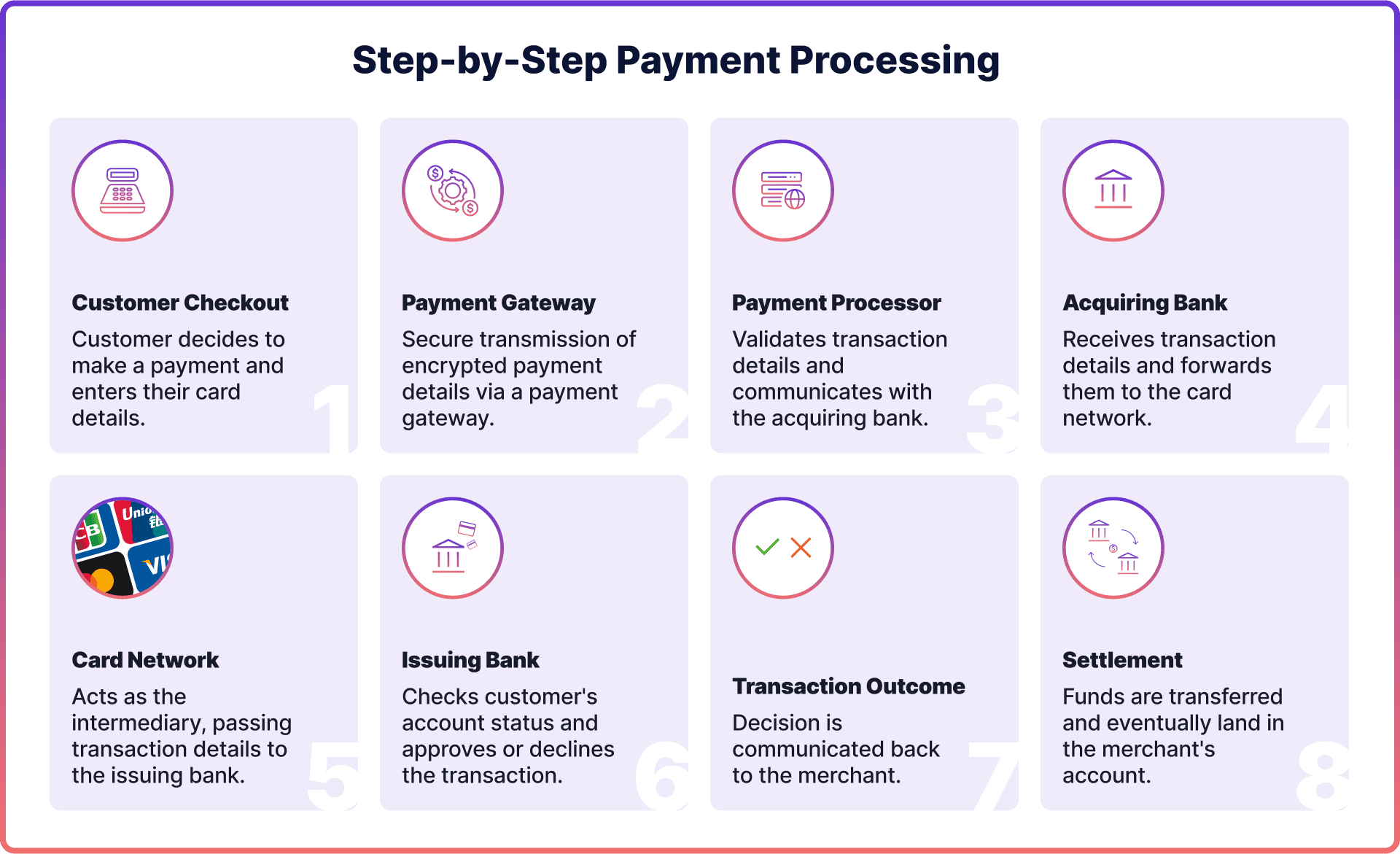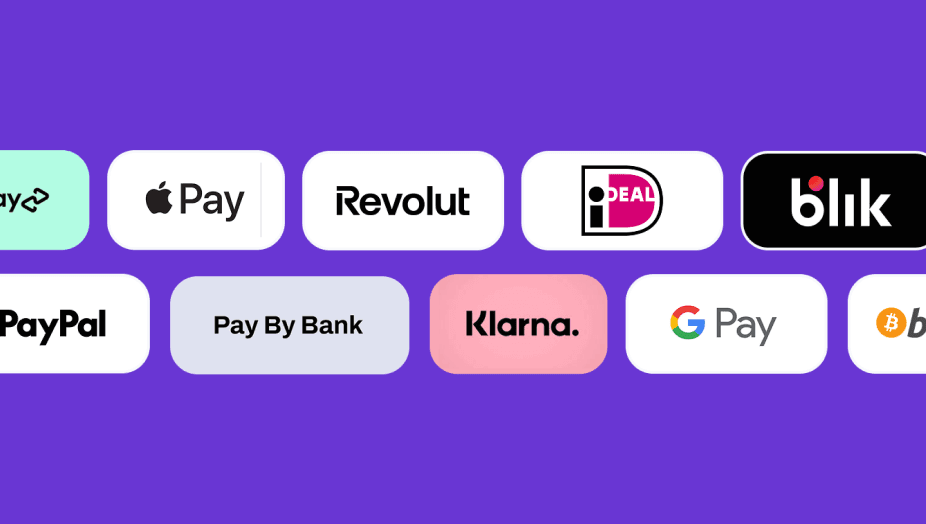
The world is going digital. Mobile apps and the so-called m-commerce are taking over the world. Statista estimated that worldwide in-app purchases reached $149.9bn in 2022. This year, m-commerce is projected to amount to almost half - 43.4% - of total retail sales, according to eMarketer.
Every business today needs an app, be it an online store, a taxi service provider or a grocery delivery. Otherwise, they’ll lose potential revenues as modern consumers love using their mobiles.
Yet, to leverage this behavioural trend, companies need to ensure smooth payment processing within their mobile applications. Here, we discuss how to choose the best payment gateway for mobile apps to meet your business needs and impress your clients.
What is a Payment Gateway for Mobile Apps and How Does It Work?
A payment gateway for mobile apps is a key piece of technology that enables businesses to accept and process payments securely through their mobile applications. It acts as a bridge between the customer and the financial institutions involved in the transaction. In a physical shop, a card machine handles this process. In a mobile app, the payment gateway performs the same role, but entirely in digital form.
When a user makes a payment through an Android app, the payment gateway securely captures the customer’s payment information, encrypts it, and sends it to the payment processor. The processor then contacts the customer’s bank to verify the transaction and confirm whether the payment can be approved. Once approved, the funds are transferred to the merchant’s account, and the customer receives a confirmation in real time.
This process usually happens within seconds, and the customer never sees the complex background operations. A good mobile payment gateway also helps ensure compliance with security standards such as PCI DSS, protects against fraud, and supports a range of payment methods including cards, digital wallets and bank transfers. It plays a vital role in making the checkout experience smooth and secure, which can directly impact customer satisfaction and conversion rates.

Top Payment Gateway For Mobile Apps
Below, we look at top 9 mobile app payment gateway providers with the focus on the UK and EU businesses, and what they can offer online merchants:
1. Noda
Noda stands out by offering a fully comprehensive API integration that supports pay‑by‑bank (open banking) as its core payment method, along with traditional options such as card and digital wallet payments. This approach gives merchants the best of both worlds: the cost-efficiency and speed of bank-to-bank payments, and the flexibility of familiar card-based options where needed. Pay‑by‑bank not only reduces transaction fees and ensures instant settlements but also simplifies the user journey, improving conversion rates.
Noda’s API is built for fast, smooth integration and is complemented by no‑code tools like payment links and QR codes – ideal for smaller merchants or those without a website. Our API supports both pay-ins and pay-outs. The platform supports bank connections across 28+ countries in Europe, powering instant payments in multiple currencies. While many other providers tend to focus heavily on card-based payments, which can be more expensive, Noda leads with open banking as a smart, modern alternative.
2. Adyen
Adyen, the Netherlands‑based acquiring bank, excels with support for global card schemes, real‑time bank transfers and local payment methods. It also offers native mobile SDKs for Android and iOS, making it ideal for larger businesses seeking full control over international payment flows. Adyen is trusted by global enterprises for its efficiency and reliability, however, because of that, is not the best choice for small and medium businesses and has high minimum volume requirements.
3. GoCardless
GoCardless specialises in direct debit and open banking, making it an excellent choice for recurring payments and subscription‑based models. It operates across multiple continents, offers real‑time payment tracking and automated retry mechanisms. This focus makes it a strong option for SaaS providers and membership services that rely on predictable income streams.
4. PayPal / Braintree
PayPal and its subsidiary Braintree offer a trusted, globally recognised payment solution with strong consumer protection. PayPal shines with its ease of use, while Braintree provides more advanced developer tools, supporting cards, digital wallets and alternative methods. Although a familiar option for many, PayPal is known for its higher-than-average fees, especially for international payments, which can be a massive downside for small and medium businesses, especially those operating beyond borders.
5. PayU
PayU is a global solution with particular strength in emerging markets like India, Latin America, and Central and Eastern Europe (particularly Poland, Romania and Hungary among others). It supports both in‑app and web transactions across seventeen countries, blending card acceptance with local payment options and growing open banking capabilities.
6. Stripe
Stripe offers a developer‑friendly platform that supports cards, wallets and many other payment methods in 46+ countries. It is known for its robust APIs, transparent pricing and extensive additional features such as subscription tools, marketplace payments and fraud protection. Stripe is well-suited to businesses looking for technical flexibility and the ability to scale globally.
7. Worldline
Worldline is a major European payments provider offering comprehensive card acquiring solutions. It serves large retailers and banks with rich omnichannel capabilities and secure fraud prevention tools. Worldline is best suited for enterprises seeking a seamless experience across physical and digital sales channels in Europe.
8. Checkout.com
Checkout.com is a London-based payments platform offering a modular API aimed at larger businesses with in-house developers. It supports custom payment flows, real-time analytics and advanced fraud tools. While it performs well at scale and suits global retailers, the setup and complexity can be a barrier for smaller or less technical merchants.
9. Mollie
Mollie is a Dutch payment provider focused on European markets. It supports local methods like iDEAL, SEPA and Klarna, with simple integration and pricing aimed at small and medium-sized businesses. However, it lacks the customisation and global reach of more developer-driven platforms, making it less suitable for larger or fast-scaling companies.
What to Consider Before Integrating a Payment Gateway for Mobile Application
The quest for a perfect payment gateway for an Android app may seem overwhelming at first. The market is practically saturated with different providers. Below are the key factors to consider when starting your research.
Unique Business Needs
The intricacies of your business will always come first. For example, would your Android app require any special features? Do you offer one-off in-app purchases or a subscription cycle? In the case of the former, you’ll need the recurring payments feature. Think about your unique business needs before starting your search. Note that some payment processors provide a payment gateway as part of their package, combined with a merchant account and other functions.
Customers
Your clients and their unique needs are of utmost importance, too. Have you conducted sufficient market research to find out who your clients are, where they’re from, and what are their preferred payment methods? For example, for global clientele, your Android app would need a payment gateway that can operate worldwide. In terms of payment methods, Android app users are likely to need Google Pay. Credit and debit cards are essential, as well as other digital wallets such as PayPal.
Security
The payment gateway you choose for your Android app will be handling your clients’ financial information. This means you have to make sure that your clients’ data is in safe hands. Ensuring that the payment gateway follows industry-standard security protocols is crucial. The Payment Card Industry Data Security Standard (PCI DSS) is what you are looking for, so filter out providers that are not PCI DSS-compliant.
Pricing
When choosing a payment gateway, you may notice that providers charge different amounts. Watch out for the payment structure, transparency in transaction fees, setup and cancellation charges, chargeback and monthly fees. Establish your budget prior to the research, and thoroughly evaluate the fees to identify a provider that meets your criteria.
UX Design
Opt for intuitive and user-friendly design to enhance the experience of your clients. A bad UX design can cost revenues and damage your brand. You can trial the gateway by requesting a demo version or documentation outlining the payment process step-by-step.
Why choose Noda for your mobile app?
- Broad Bank Connectivity
Connect with 2000+ banks in 28 countries across Europe through a single, seamless integration. - Low Transaction Fees
Optimise your margins with competitive, cost-effective pricing designed for high-volume growth from 0.1%. - Instant Settlement
Get paid in seconds with real-time account-to-account transfers – no intermediaries, no delays. - Multi‑Rail Payments
Offer customers more choice by combining open banking, cards, and digital wallets in one streamlined platform. - Hands-On Support
Enjoy expert guidance from a dedicated manager to ensure a smooth launch and ongoing success, as well as tech support ready to assist with your mobile app’s manual integration.
Contact Noda for a no-obligation demo. Our open banking experts will be happy to look into your unique business case.
FAQs
What are the key factors to consider when selecting a payment app?
Look at your business needs, preferred payment methods, pricing, security (like PCI DSS compliance), and how easily it integrates with your app.
How can I integrate a payment gateway?
Most providers offer an API or SDK, along with guides to help you connect their system to your app. Some also offer no-code tools or plugins.
How do I integrate a payment gateway in an Android app?
Choose a provider with a comprehensive API or an Android SDK, follow their setup steps, and add the payment flow/API-powered payment method into your app using your developer team.
Which payment gateway works well on mobile?
Gateways like Noda, Stripe, Braintree and Adyen are built for mobile, supporting fast, secure checkouts and mobile wallets like Google Pay.
Latest from Noda

Alternative payment methods: 2026 Guide for Businesses

Open Banking Payments: SME E-Commerce Guide (UK)

Payment Methods in Spain 2026: A Guide for Online Merchants


